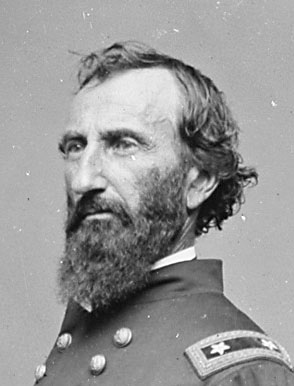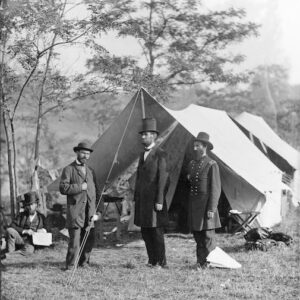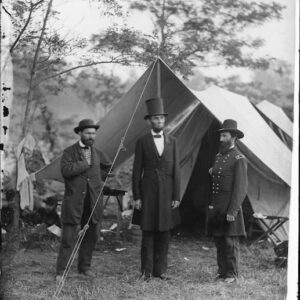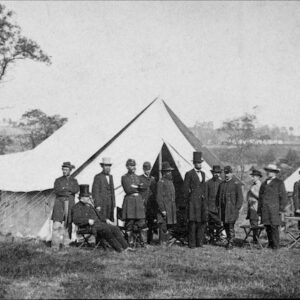Tag: McClernand (John A.)
 Wikipedia says: John Alexander McClernand (May 30, 1812 – September 20, 1900) was an American lawyer and politician, and a Union general in the American Civil War. He was a classic case of the politician-in-uniform coming into conflict with career Army officers, graduates of the United States Military Academy. He was a prominent Democratic politician in Illinois and a representative in the U.S. Congress before the war and then served as a subordinate commander under Ulysses S. Grant in the Western Theater, fighting in the battles of Belmont, Fort Donelson, and Shiloh in 1861–62.
Wikipedia says: John Alexander McClernand (May 30, 1812 – September 20, 1900) was an American lawyer and politician, and a Union general in the American Civil War. He was a classic case of the politician-in-uniform coming into conflict with career Army officers, graduates of the United States Military Academy. He was a prominent Democratic politician in Illinois and a representative in the U.S. Congress before the war and then served as a subordinate commander under Ulysses S. Grant in the Western Theater, fighting in the battles of Belmont, Fort Donelson, and Shiloh in 1861–62.
A close friend and political ally of Abraham Lincoln, McClernand was given permission to recruit a force to conduct an operation against Vicksburg, Mississippi, which would rival the effort of Grant, his department commander. Grant was able to neutralize McClernand’s independent effort after it conducted an expedition to win the Battle of Arkansas Post, and McClernand became the senior corps commander in Grant’s army for the Vicksburg Campaign in 1863. During the Siege of Vicksburg, Grant relieved McClernand of his command by citing his intemperate and unauthorized communication with the press, finally putting an end to a rivalry that had caused Grant discomfort since the beginning of the war. McClernand left the Army in 1864 and served as a judge and a politician in the postbellum era.
…Upon the outbreak of the American Civil War, he raised the “McClernand Brigade” in Illinois, and was commissioned brigadier general of volunteers on May 17, 1861. His commission as a general was based not on his brief service in the Blackhawk War, but on Lincoln’s desire to retain political connections with the Democrats of Southern Illinois. He eventually resigned his Congressional seat effective October 28. He was second in command under Ulysses S. Grant at the Battle of Belmont in Missouri on November 7, 1861, and commanded the 1st Division of Grant’s army at Fort Donelson; his division, whose flank was not properly anchored on an obstacle, was struck by a surprise attack on February 15, 1862, and driven back almost two miles before he was able to get reinforcements. On March 21, he was promoted to major general of volunteers for his service at Fort Donelson. At the Battle of Shiloh on April 6–7 he commanded a division of the Army of the Tennessee, which resisted, along with that of William Tecumseh Sherman, the strong Confederate assaults around Shiloh Church.
McClernand’s service as a major general was tainted by political maneuvering, well resented by his colleagues. He communicated directly with his commander-in-chief, President Lincoln, offering his criticisms of the strategies of other generals, including Maj. Gen. George B. McClellan’s in the Eastern Theater and Grant’s in the West. In October 1862, McClernand used his political influence with Illinois Governor Richard Yates to obtain a leave of absence to visit Washington, D.C. and President Lincoln, hoping to receive an important independent command. Secretary of War Edwin Stanton agreed to order him north to raise troops for the expedition against Vicksburg. Early in January 1863, at Milliken’s Bend, McClernand superseded Sherman as the leader of the force that was to move down the Mississippi. On January 11, 1863, he took Arkansas Post, an expedition suggested by Sherman. On January 17, Grant, after receiving the opinion of Admiral David Dixon Porter and General Sherman that McClernand was incompetent to lead further operations, united a part of his own troops with those of McClernand and assumed command in person, and three days later ordered McClernand back to Milliken’s Bend. During the rest of the Vicksburg Campaign there was much friction between McClernand and his colleagues. He intrigued for the removal of Grant, spreading rumors to the press of Grant drinking on the campaign.
McClernand landed his men on the Mississippi River levee at Young’s Point, where they “suffered from the heavy winter rains and lack of shelter. Tents were not issued to the troops because they were within range of the [Confederate] guns at Vicksburg; so the more enterprising men dug holes in the levee and covered them with their black rubber blankets. Floundering in knee-deep black mud and still exhausted from recent expeditions, numerous soldiers fell sick. Many cases of smallpox were reported. Hospital tents lined the back side of the levee and were crowded with thousands of sick men. Many died, and soon the levee was lined with new graves.”
It was Grant’s opinion that at Champion Hill (May 16, 1863) McClernand was dilatory, but Grant bided his time, waiting for insubordination that was blatant enough to justify removing his politically powerful rival. After a bloody and unsuccessful assault against the Vicksburg entrenchments (ordered by Grant), McClernand wrote a congratulatory order to his corps, which was published in the press, contrary to an order of the department and another of Grant. He was relieved of his command on June 18, two weeks before the fall of Vicksburg, and was replaced by Maj. Gen. Edward O. C. Ord. The duty of notifying him of his dismissal fell to Lieutenant Colonel James H. Wilson, who’d held a grudge against him for an earlier chastising. Once McClernand read the order, he exclaimed in shock “I am relieved!” Then seeing the look on Wilson’s face, he made a joke out if it by saying “By God sir, we are both relieved!”
President Lincoln, who saw the importance of conciliating a leader of the Illinois War Democrats, restored McClernand to a field command in 1864. On February 20, 1864 McClernand returned to his old XIII Corps, now part of the Department of the Gulf. Illness limited his role and by the time the Red River Campaign commenced, McClernand had been replaced in command by Thomas E. G. Ransom. For several days at the end of April McClernand returned to the field to command the detachment of two divisions from the XIII Corps participating in the Red River Campaign. He resigned from the Army on November 30, 1864 and in April 1865 played a prominent role in the funeral of Lincoln, his old friendly rival.
Showing all 3 resultsSorted by latest


